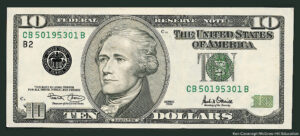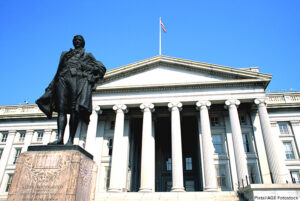
Not since the folks at School House Rock set American History (among other subjects) to song, has popular culture been as excited about our Founding Fathers as they are today. This is due to the current Broadway smash, Hamilton: An American Musical, about our nation’s first Secretary of the Treasury. Because btw is all about current events (which sometimes includes the current examination of some not-so-current ones), we decided it was time to take a closer look at what the fuss is all about.

A Brief History (of the show . . not the history)
Lin-Manuel Miranda, the son of Puerto Rican immigrants, grew up in New York City. After graduating from Wesleyan University, his musical In the Heights (about life in the neighborhood where he grew up) played on Broadway in 2008, where it earned a Tony Award for Best Musical. In 2009, Miranda was invited to the White House to participate in an “Evening of Poetry, Music and Spoken Word.” While many assumed he would present a selection from his previous work, Miranda surprised (and mesmerized) the crowd that included President Obama, with what he then-called the Hamilton Mixtape. The footage from that performance went viral, prompting history teachers all over the country to show their students how “their art form” could be used to tell an old story.
Five years later, the full musical version of Hamilton premiered Off-Broadway, starring Miranda, who wrote both the book (the dialogue) and the score (music). The cast is deliberately made up of African-American and Latino actors playing the parts of the Founding Fathers. According to Miranda, this was to depict the United States as it appears today.
In addition to being personally influenced by hip-hop and rap (as well as classic musical theater), Miranda has said that rap’s rhythm and density was best suited to tell this story. The production has received rave reviews and moved to Broadway in August of 2015, where it continues to break box office records.
Historically Accurate?

It was a high school paper about the infamous duel between the Hamilton and Vice President Aaron Burr that initially sparked the attention of a young Miranda. He said that the situation reminded him of the very public rivalries between old-school rap artists (like Tupac Shakur and the Notorious B.I.G.). But it was the Hamilton biography Creating Capitalism by Ron Chernow that directly influenced Miranda’s decision to put fuse hip-hop and classic Broadway show tunes to create his own version the events of our nation in its infancy.
In addition to the portrayal of the title character and other Founding Fathers George Washington and Thomas Jefferson, the musical sheds light on some of history’s lesser-known figures, such as Aaron Burr, the Marquis de Lafayette and James Madison, as well as Hamilton’s headstrong sister-in-law Angelica, and Hamilton’s widow, Eliza, who out-lived him by 50 years and worked hard to secure his legacy.
As for the historical discrepancies, they do exist, although the creators insist they took great pains to be as historically accurate as possible (even hiring Chernow as historical consultant for the show). Some of the inaccuracies include the fact that the election of 1800 was not won in a landslide, as a song suggests, but was a close contest. President John Adams did not fire Hamilton; he had resigned more than a year before Adams’ inauguration. Jefferson’s resignation and Washington’s farewell happened 3 years apart, not simultaneously as conveyed in the musical version. Also, the Schuyler sisters were three of 15 children that included brothers (Angelica sings that by being born to a man with not sons, it is her responsibility to marry well in order to carry on the family wealth.)
BUT . . . the show has been particularly praised for getting President Washington’s farewell correct, as well as Hamilton’s many accomplishments (the establishment of a National Bank, the Neutrality Proclamation, and the secretive “dinner deal” that re-located the central government from New York to modern-day Washington, D.C. In New York City, Hamilton has become an educational phenomenon. The show’s producers have partnered the city’s school district, where tens of thousands of students are packing the theater for student-only matinees.
